[CLICK ON BLUE LINKS FOR MORE INFORMATION]
Many of the posts on this site are about the Sea Gull Restaurant and Cellar Bar in Mendocino during the 70s and 80s. This was a special time for many who lived in Mendocino at that time. They are now obviously older and scattered about. There are other histories of this period. One of the best is Nicholas Wilson’s wonderful book Mendocino in the Seventies. I understand James Maxwell has a book coming out on his fairy tale paintings that graced the ceiling and walls of the Sea Gull Cellar Bar. The posts you will find here are based solely on my memories of those days.
An earlier post on the FIRE can be found HERE
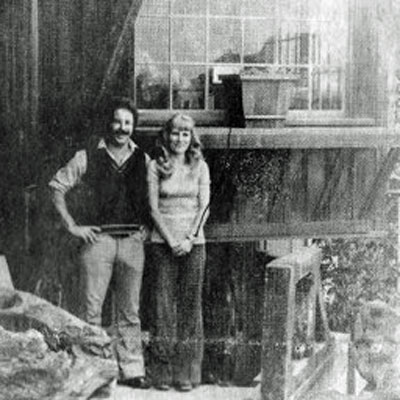
Before the fire, entrance to Cellar Bar
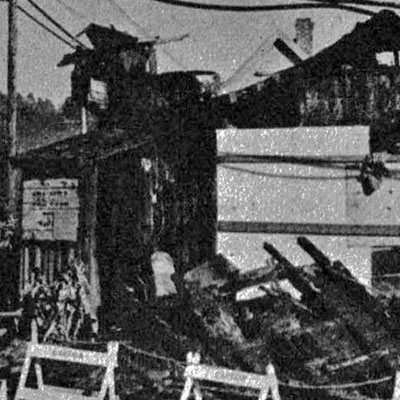
After the Fire, entrance to restaurant
Sea Gull Cellar Bar Remembered by Bill Bradd can be found HERE

Photo by Stuart Marks
In the late afternoon on the day of the fire, long after the flames were extinguished and the firemen were gone, there was a knock on the door at my house behind the restaurant. The house, though threatened, survived the fire with minimal damage. Many friends helped move our furniture and belongings out and then back in again when it was safe. I was sitting at the kitchen table when I heard the knock.
I opened the door to be greeted by R. O. Peterson. Peterson owned the Mendocino Hotel and other properties on the coast. He was the founder of the Jack in the Box restaurant chain and many local people were wary of his intentions. I had always had cordial relations with him but did not know him well, hardly at all. He shook my hand and then went right to business. He expressed his sadness about the fire and asked if I was going to rebuild. I told him I hoped so, but I would need some time to assess my situation. He then offered “any help I can provide including financing.” I’ve thought about that moment many times. The offer was genuine and without any strings attached. It was something wonderful and selfless that cheered me immensely after what I’d been through. To think that an almost stranger would do such a thing was remarkable. R.O. Peterson and many who were equally generous with whatever they had to contribute, Mendocino people, they were how I knew I’d picked the right place to live out my life.
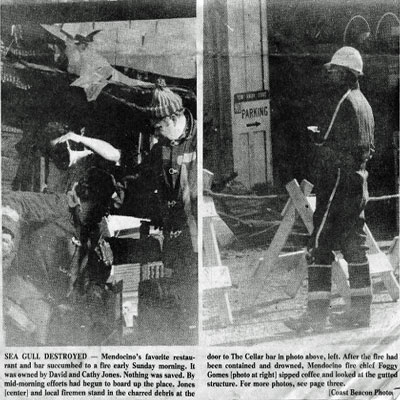
I remember the moment clearly. I thanked R. O. from my heart. I refused the offer. I don’t think he was surprised. We both knew that if I rebuilt, I would want to do it myself, that I would not want to be in debt to anyone but the bank. That story, rebuilding the Sea Gull, will come later. First I want to describe what happened in the immediate aftermath of that day, December 12, 1976.
The local newspapers published series of articles and letters to the editor in the days following the fire. Cathy and I were incredibly touched by the emotion and praise, the suggestions and offers of help.
My first order of business was to hold a meeting with the employees. It was a few weeks before Christmas. Everyone was now out of a job. Money would soon be short. There were odds and ends recovered from the fire. Some bottles of alcohol survived behind the bar although they were scorched. There were a few, very few, artifacts, old hinges, even the scorched dollar bill used to buy the first drink after I owned the restaurant. Nothing valuable. I passed these out to employees in lieu of the usual year-end bonuses. I explained that I would be demolishing and hopefully rebuilding. I could not offer specifics. I knew most employees would need to seek alternate employment since they depended on the income that was now be missing. I encouraged them to immediately start looking for jobs. The winter in Mendocino is the low season and jobs are not easy to find.
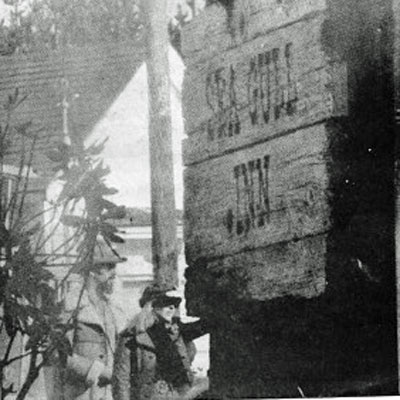
Ironically Cathy and I had hired architect-builder David Clayton to build a residence for us in Little River on property we’d owned for a few years. Construction was scheduled to start the day after the fire. I called David late Sunday. He had heard the news. I told him the residence was obviously off but I would be needing a new restaurant if I could find adequate financing.
David came by the day after the fire. We set up a tall ladder and climbed to the highest point we could get to from the floor of the burned out restaurant. Nothing had been cleaned out or removed. The area was not stable. Everything around us was black and sooty and smelled of smoke. It was spooky. The old building had a second story attic that had never been finished. David suggested we utilize this upstairs space in the new building. He thought if we could get up high enough from the floor, we could take some pictures of a potential ocean view that might help convince the bank to finance the rebuild.
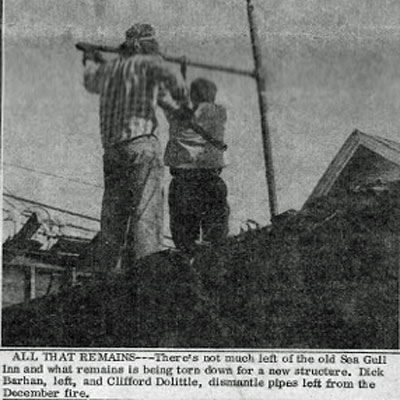
A number of friends and employees arrived in the next few days to help with the cleanup. I could not afford to pay them but I did provide lunch and beer and other refreshments. The first order of business was to apply for a demolition permit. Thankfully it was quick to come. We were well underway with the cleanup before the end of December. Don Pollard offered the use of his crane. We ordered some large dumpsters and lifted out all the debris. The worst of the charred wood and metal was gone in a couple of days.
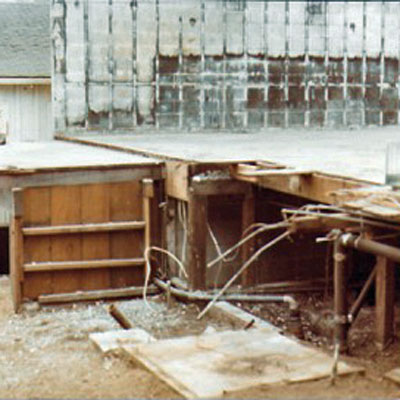
Remaining concrete brick firewall facing Fire House
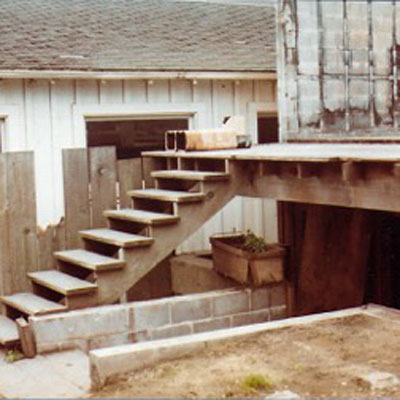
Back stairs leading to garden next to Fire House
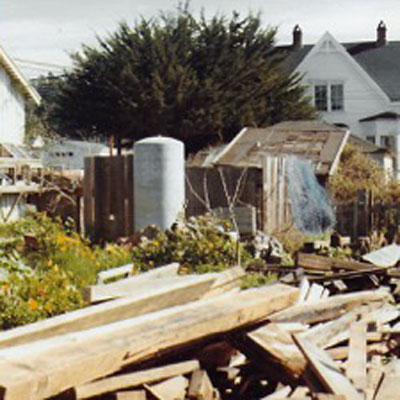
Garden area stacked with salvaged wood, Sea Gull Inn to the south
Meanwhile, we moved the Wolf ranges and large stainless dishwasher out of the kitchen. They were blackened from the fire but salvageable. Lorna Young and Marlene McIntyre got a group of employees together to scrub down the equipment until it shined like new. Everything else was a total loss. The aluminum meat slicer had melted into a silver moonlike mass. The refrigerators were deformed into plastic and metal blobs. Dishes, utensils, pots and pans, supplies, shelving, tables—all were lifted out by the crane and hauled away. People stood outside and shook their heads in disbelief. Phone crews worked furiously on the phone lines that had been destroyed in the fire. It took weeks, in some cases months, for phone service to get back to normal. The fire was so hot that the pot metal on the pay phone outside the front door of the restaurant slagged. It hung down reaching for the ground like a stalagmite left in the burned out cave of the entrance alcove. Some of the windows in the Mendosa apartments across the street broke from the heat.
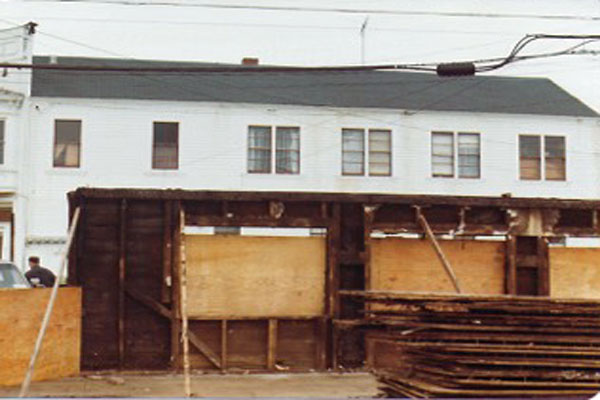
It was eerie sifting through the rubble left from the fire. I remember a small porcelain circular tray in the bar with a picture of Sairey Gamp. It fell face down and cleaned up pretty well. The inscription was from the epitaph of an old charwoman: “Don’t pity me, don’t pity me never. I’m gonna do nothing forever and ever.” I discovered later that it was a quote from James Agate. Someone with a sense of humor had put Dickens’ Sairey Gamp together with the picture of a charwoman and the quote from Agate. The back bar, having survived a hundred years hidden behind another bar in Fort Bragg, having survived a move to Mendocino and some good years of service in the old Sea Gull Cellar, was scorched beyond repair.
The floor on the restaurant level required special care. With the interior walls gone, the areas of the coffee shop and kitchen and dining room looked smaller than I expected. It was interesting to find that the kitchen took up as much space as the dining room and the coffee shop together. Paul Townsend, Dick Barham, Steve Scudder, Steve Weingarten, Doug Nunn, Sheldon Cox and others did the difficult and exhausting work of using crowbars to pull up several layers of plywood and linoleum that were laid down on top of each other over the years. We finally removed it all down to the subfloor. The foundation and subfloor were in good shape. David Clayton assured me that they could be reused with some bolstering. The cement block firewall between the restaurant and the firehouse did its job protecting the firehouse from the fire. The building and fire inspectors examined the wall and certified that it could be reused without demolition except for a few layers at the top.
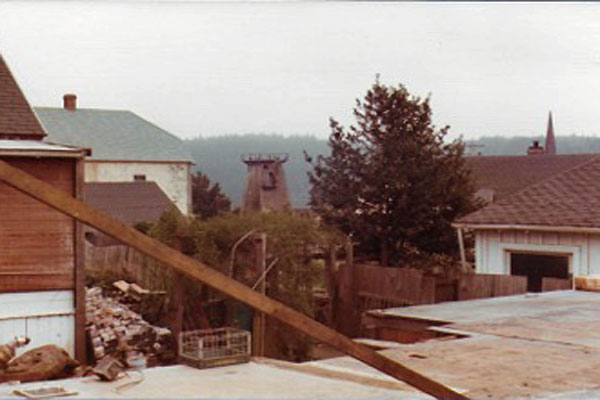
Looking East from the old Sea Gull floor
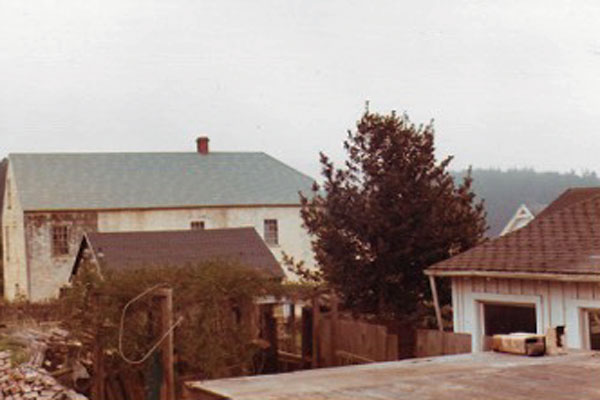
Looking From old Sea Gull Floor toward Headlands Inn
On the day when we were removing the last of the plywood and linoleum, random friends started dropping six packs of beer over the plywood barrier we’d constructed around the restaurant to keep people out. We’d work for a bit and then plop, a few beers would tumble down over the top. We had more than our share. Finally everyone was gone except Scudder, Dick and I. We were feeling pretty good because the difficult job of the floor was done. The beer raised our spirits as well.
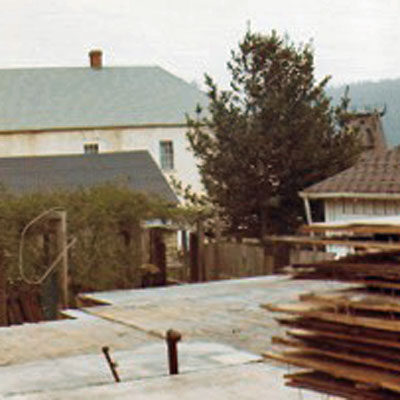
Old Sea Gull Floor with layers of plywood stacked
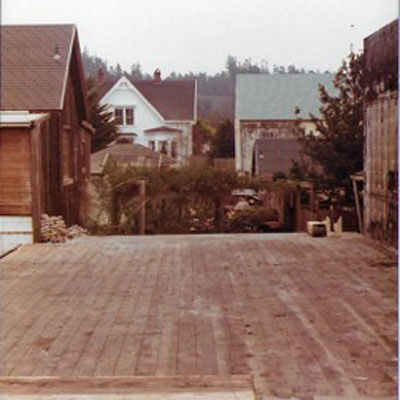
Looking East, floor exposed, cement block wall right
Cathy kept coming from the house next door to remind Dick that Ann expected him home. Soon! Cathy was making us a chicken dinner and it was ready. Now! Claudia was on her way to pick up Scudder and he BETTER BE READY. We laughed and refused to budge, wanting to savor the moment and tell a few more stories. Finally, Claudia showed up and Ann was right behind her. Dick decided it was time to leave. I went back to the house. Cathy had locked me out annoyed that I had ignored her. I pounded on the door a few times. She threw open the door and doused me with a pot of cold water. It woke me right up. That was a night I will surely never forget.
The next morning it was foggy. I was greeted by a group of seagulls flying over what was left of the Sea Gull building. I took that as a good sign. There was plenty of work ahead but we had made a good start.
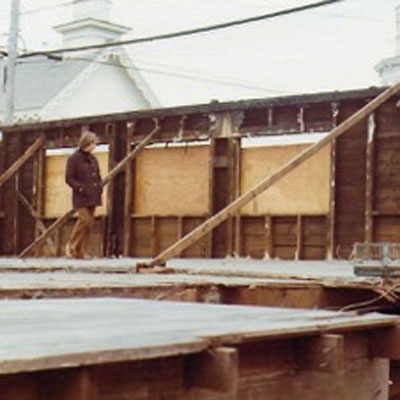
Friend Judy Johnson inspecting north wall
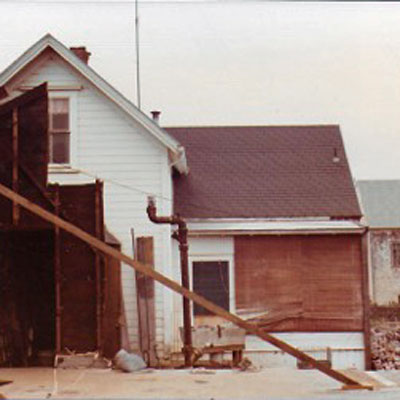
Residence viewed from burned kitchen floor
… to be continued
ARTICLES AND LETTERS
Sea Gull Burns, Town Mourns, Mendocino Beacon, 12-15-76
The town mourns.
It’s like an old friend died,” Sharon Kinsey said Sunday night.
She had worked in the Sea Gull kitchen for over two years and would have worked Sunday too but by dawn it was in flames.
“Places burn down and you think, ‘Ah, that’s too bad.’ But with this you think, ‘Ach, what are we going to do?’”
What, indeed are we going to do without our community crossroads?
Owner David Jones recalls the sequence of events that lead to discovery of the fire.
After the restaurant closed Saturday night he and manager Marlene McIntyre and some friends came over to his and Cathy’s house, which adjoins the restaurant. Later, Jones returned. “Everything was in order.” The janitors and bartenders left about 2:30 a.m.
Jones said he got up at 6 a.m. as usual. “I could smell smoke from my kitchen. I opened the storage room. It was smoked up. I knew a large fire was somewhere in the restaurant.
When the hallway door leading to the restaurant was opened, Jones was knocked down by a back-draft of pent-up hot gasses.
He awakened the sleeping occupants at the house and while someone called the fire department, Jones ran up the street to fireman Skip Jones’ house.
“Standing on Lansing Street I looked back. The town was empty. I saw flames shooting out the bar five or six feet high. As soon as some air got in, it all ignited.”
The alarm sounded shortly after 6:30.
Gary Lyte had been a cook at the Sea Gull for three years.
“The siren went off. I looked out the windows. I thought it was a forest fire in the hills. There was so much smoke you couldn’t see the cars in the street.”
Chris Lyte, 12, brought the news. “He said, “Dad, it’s the Sea Gull.” He was in tears.
“I walked over and couldn’t believe it. It was totally engulfed. My first reaction was ‘Where’s David?’ I couldn’t see if the house (the Jones’ which adjoined the restaurant) was there or not.”
“It was incredible. It burned out. It didn’t seem to take very long.”
Thirty to 35 firefighters led by Mendocino fire chief Foggy Gomes battled the flames. Skip Jones says: “When we got our lines hooked up and everything, we went right at it and pretty well knocked it down.”
The fire was under control within two hours.
Luckily it didn’t spread to the house or the fire station next door.
Of all the patrons near and far who loved the Sea Gull and kept it humming day and night, it was a devoted crew who loved it best.
Many of the 53 employees, arriving one by one, gathered in the streets as the new day broke clear and bright. A stench of charred wood hung in the still morning air. It hurt the nostrils. Eyes stung. The gutted structure was a cruel sight.
Marlene McIntyre had been with the business 12 years.
“I thought the fire might have been just in The Cellar. But I went down there and I saw it really was the whole thing. I saw the cash register I had stood behind, the kitchen I started in. I mean, what can I say? That’s been my life. I feel really concerned about a lot of people who have depended on us. It was real love. It was me.
“I’ve learned you cannot love any material thing too much because it can be gone in 10 minutes. You’ve got to depend on your friends and yourself.”
Mendocino firemen called for assistance at 6:45. “We wanted some water on hand,” Skip Jones said. Fort Bragg sent four trucks and 10 or 12 men.
There was enough water. It came from the Masonic Hall storage tank and the high school. Barry Cusick, owner of the laundromat, made four water runs with his new 1500 gallon tank truck. Jones estimated eight to 10 thousand gallons were used to contain the fire.
Phone and cable television services were interrupted in many parts of town and the coast because of the fire. REACT, a citizen band radio group, quickly responded to the communications loss. Members stationed themselves in outlying areas, ready to broadcast an emergency.
Lyte said:
“Everyone had the feeling ‘I don’t want to watch it. I want to walk away.’ I’ve never been hugged by so many people in my life.”
“The Sea Gull is a very, very special place. It was a special place to the people who worked there because David Jones is one of the most human people I ever met in my life. People came before everything with him.”
This was the worst fire since the Preston house burned in the 1950’s, Skip Jones said.
Sharon Kinsey:
“It’ll be hard to adjust to not seeing all those people every day. It’s like a family to me. I can’t imagine working in any other place because David was a really special person to work for.
“It’s like an institution, the community center of Mendocino. Every time anything happened people came in to discuss it. It’s like the Sea Gull is my symbol of stability, the first place I enjoyed working at. Now I have to be stable on my own.”
Gary Lyte:
“And it was just the whole charisma of the community and people coming in there and saying “Hi,” and the bus drivers, the phone men, police, teachers, everybody came in there.”
When it was over an investigator tried to determine the cause. It is believed a cigarette was left smoldering over in the big stuffed chair at the center of the bar. The spot where the chair stood was the only place burned through the wood floor down to the concrete. The inside stairwell probably acted as a flue.
Marlene McIntyre:
“I’ve often thought of writing a book about the people. It’s been the heart of the town. It will never be the same, unless David did it.”
When night came she and others searched the rubble with a flashlight. “We couldn’t find anything except a couple of hinges off one of the chests. That’s all we could find.
“Our customers were the real people of the town. Whether they were the street person or the business person, they each had a soul.
Lyte remembers a conversation:
“I think that Nicole Ginsburg said it best. She said the Sea Gull is the mandala of Mendocino, the spiritual hub.
“Now I want to know what are we going to do for cheeseburgers, cheesecake, and pumpkin pie?”
The Sea Gull had only minimal insurance, Jones said Tuesday. He has been flooded with all kinds of offers of help, but right now he just needs time to think. He wants to clean up the loose stuff, get it out, board the place up. He says he’s heavily in debt. He needs to find out where he stands financially.
Then he wants to call all former employees together to talk about his future plans. That could be anything from selling everything to rebuilding it more or less the way it was.
If he had his way, “What I’d like to do is rebuild it. The Sea Gull is really an institution in the town of Mendocino. Everybody comes into it and enjoys it. It was a lot more than a restaurant and bar. It was like a public meeting place. Now there’s no place like that. I’ve been here for four years. I felt like I was just getting started. We had a fantastic staff.
“The Sea Gull cannot be replaced, but something quite similar with good feelings can be put back. It will look different, but not entirely. I would go back to the same scale. But you know, you can’t replace 20 years of history. Martin Hall’s influence was pervasive. He basically built it, furnished it with all the antiques.
And there was the good will. A lot of that good will remains.
View From The Bridge, Robert Greenway, Mendocino Beacon, December 15, 1976
Strange creatures we are—seldom realizing what we have until we’ve lost it.
Noisy and busy as it was, it was our living room; it was somehow alive, a main crossroads and meeting place for an entire community, and a frequent target (“too much cigarette smoke”, “too crowded”, “what do you mean, ‘it’s too late to order a hamburger’?” It was the place to gather on Sunday evenings after the tourists had left, on Mondays after poetry readings, on Tuesdays after groups and classes, a place where you’d be pretty sure to see a familiar face when you were feeling kinda lonely.
So when we were running down Ukiah Street early Sunday morning, drawn by the alarm and the giant column of apricot-colored smoke, seeing immediately that the building was a complete loss, feeling the dream-like shock that “this isn’t really happening”, I could also notice Gary Lyte staring into the flames and remember that I had never bothered to tell him that actually, buck-fifty or not, it was the best hamburger on the whole coast, nor had I told Tony that it was as much his mellow vibes I came to get as any drink, nor had I told David that his work of carrying on the legacy of Martin Hall was a good and solid contribution to the health of the community.
It was the coldest morning I remember feeling in Mendocino. A group of us had made a rather hurried and nervous foray into Albion the night before to honor the house-warming of a friend and it turned out to be a few doors down from where Jim Reed died.
We stayed up late talking of Jim, sharing stories of his prodigious talents, and, yes, his many difficulties as well. Somehow he carried within that one gnarled frame the contradictions carried by so many poets—the love of words and morose silences; the passion for beauty and the haunted reflections of the ugliness of our times; the sense of re-birth coming with any creative act, and yet the ever-present destructiveness lurking about as well.
I didn’t know Jim Reed all that well, but he was a kind and very real human being, and a very real part of my community. I learned from him, and wish now I had squeezed him in, too, the other day when I stopped to pick up a whole flock of hitch-hikers. I wish his spirit well in its new journies.
Anyway, we were tired and shocked, wondering about the waves of energy, sometimes so soft and loving, sometimes so angry and violent, that seem to flow through the humans struggling to live righteously on this coast. When the alarm a.m.went off (David Heider said it was exactly 6:25 a.m.—I thought it was much earlier), and even long after as we helped David move the stuff out of his endangered house and office, it was hard to tell where the dream stopped and the conscious reality began.
We watched, feeling helpless, as the morning breakfast crew arrived one by one, mouths gaping, some weeping. We watched David walk over amidst the still smoldering ruins and pick up the so-familiar metal sea gull, now blackened. We hears so many folks pressing him for his future plans (the “what now, what now, what now” sounding like gulls swirling in greedy worried sympathy), heard there was little insurance to cover the immense losses, heard Gordon the night janitor already mythologizing the event (“speaking as a writer, it was the best job I ever had”), realized that almost everyone was thinking about “all that water”, realized how vulnerable the entire town was, to sparks, to the elements—felt how vulnerable we all are. And we watched the town come by, one by one, to look and pay respects, to lean forward peering into the blackness for one last touch into what so recently had been such a living and vibrant reality. As Antonia said, everything is changed, it will never be replaced; some kind of line has been crossed, some kind of phase ended.
The dark time of the year, a time of mourning, with all the implications of new beginnings and new opportunities, all the need to “let go”, that the term implies. A tiny spark from (I’m told) one dropped cigarette, smoldering into an inferno that profoundly affects an entire community. I remember the flames reflected on the faces of the children—excited, awed, frightened—and I think of a statement I heard at a lecture the other evening: “We are lived by powers we pretend we understand.”
We are in proximity one to another—we are interconnected. Whether or not this always pleases us is irrelevant. It’s a fact. As we stood around on a December Sunday morning, sharing incomprehensible losses, we know that, lurking not so far beneath the divisions and abrasions, is a community whose evolutionary heritage is as much (or more) based on cooperation as on competition, violence, and territoriality.
Art Center Rapport, Bob Avery, Mendocino Beacon, December 17, 1976
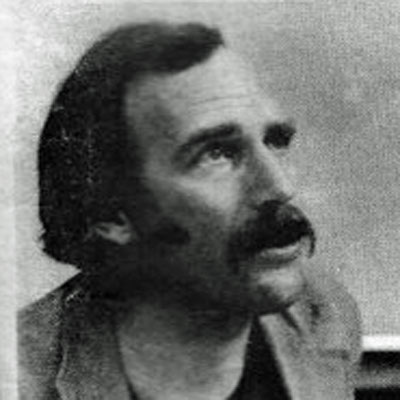
Bob Avery
Saturday night I had a drink there; Sunday morning it was gone. I couldn’t believe it. The Sea Gull had burned—completely—and the loss was deeply reflected in the faces of everyone I met. The place that I had affectionately called “my other office”, the place that had succored so many and spawned endless conversations, contracts, and love affairs, had become (without most realizing just how firmly) a fixture, a second home, a landmark … was now reduced to ashes. For those of us who had so often lightly complained that the Sea Gull was the only place to go, we now have no place to go, no place to get a good breakfast or a quick cup of coffee or a drink or a warm place to sit on a chilly night, with friends.
And David Jones, who for the past several years of his ownership of the Sea Gull, had gone way out of his way to encourage, help and serve the community and his employees, how must he feel? I hope—rather, I know—that he must be deeply gratified by the many offers of money, labor, materials, energy that have been pro-offered by the town that shares his loss, but the terrible fact of the tragedy and the financial ramifications are realities that can crush and maim, and we—the townspeople and David’s friends—should not be too disappointed if David should find it too difficult to rebuild. He has said that he needs a couple of weeks to think, to work out the financial realities, and he has also said that if it proves feasible for him to proceed that he would like the Sea Gull to live again under his hand. He is carrying a huge burden, and I think we should give him the requested space to decide what he must do. As much as we all want to see the Sea Gull reborn, it must be David’s decision; to work out on his own, and we certainly owe him that much.
There are several efforts currently underway to organize the benefits of one kind or another for David and his employees, which is a wonderful thing, but I hope this kind of energy won’t influence David to make a decision that he will ultimately find impossible to live with. Perhaps we should temper our enthusiasm for the requested two week, give David the time to make the right decision for himself without pressure, and then—provided he decides to rebuild—dive into the process of assistance with all the assurance and enthusiasm we can muster. All the offers made so far are real and honest, and David knows that, so we can surelu assume that the assistance will still be available two weeks or even a month from now. Maybe I’m wrong, but I think we should give David all the time he needs, and whatever he decides to do will be O.K. with me.
Letters to the Editor, Mendocino Beacon Dec 15, 1976, Antonia Lamb

Antonia Lamb
The Sea Gull is gone. It was under-insured. It was the heart of the community activity, from breakfast before work to a quick drink at last call. Maybe we can have it again. Right now its future is in doubt. David, its owner, who kept it running with warmth and integrity, is in need of all our love and support. The large staff (over 4 dozen) are without jobs. The building and all its contents are destroyed. But the spirit remains.
May I suggest that the friends of the Seagull (“Friends of the Seagull”?) join together in offering labor, time, money, beautiful artifacts, and knickknacks, all toward the rebuilding of this landmark in our town. We can’t have it back exactly as it was. But we can have it back, maybe, if we pull together NOW.
I don’t have any money. But I would spend a few days hammering nails, would give some of the lovely things that gather dust in my closets, would do anything I could to help. I’m sure many of us feel the same. Let’s do something about it. Maybe we can rise out of these ashes, like the Phoenix, with love —.
Letters to the Editor, Beacon Dec 15, 1976, Anthony Miksak

Sea Gull Cellar Bar Napkin Art, Karen Kessler artist
I lost a good friend Sunday morning—we all did when the Sea Gull burned down. There is a black, gaping hole in the Mendocino Community. What will fill it? The old, funky, Martin Hall-David Jones mish-mash of a place, the eccentric paintings, Coca Cola trays, antiques, tapestries, the rugs, the Indonesian masks, barrels, that incredible hand-sawed back bar … all gone … The smoky Cellar, the one true community center Mendocino ever had, even for people who didn’t drink … gone. Hundreds, maybe thousands of people can hold the old Sea Gull in their memories—it may be reborn, hopefully it will be, but the crazy, beautiful jumble is done—charcoal—broiled in two hours.
What next? Now there are 35 to 50 employees out of work two weeks before Christmas. Maybe a benefit for the most hard-hit to bring cheer and spirit back?
And what happens to the Sea Gull? Will there be a “Phoenix” in that spot next year? Could Mendocino help David Jones rebuild a bar and restaurant that would also be the the true community center that the Sea Gull became? I think such a thing is possible—it’s a time for grief and despair and a time for hope: we all can come together around a community need like this. Admit it—you loved the Sea Gull more than you knew. But such things have to happen soon, right away, before the sense of loss fades away, before we all get used to a distinct lowering of our standard of living. Here we are—many, many creative and beautiful people, all ages and all persuasions, feeling a loss, sitting in our houses, cabins and trailers scattered throughout this area. We need to find each other, to build something together. If we don’t someone with bucks and ambition certainly will.
Ideas are racing through my head on this first day after the fire. I think of the need for some kind of community meeting, maybe at the Art Center or Toad Hall to meet with David Jones and discuss the future. My God—the local talent here could build a new Sea Gull (Phoenix) in three months. And what about a Christmas party for everyone, especially the Sea Gull employees?
Please bear with me while I add my personal thank you to the people of Mendocino. You made working the Sea Gull Cellar a pleasure and experience I will never forget. I’m crying for the good times we all had, the love we shared. It was always okay. You never got too drunk or too crazy. We’re all still alive and I love you all. Thank you.
Letters to the Editor, Mendocino Beacon Dec 15, 1976, Astra Thor
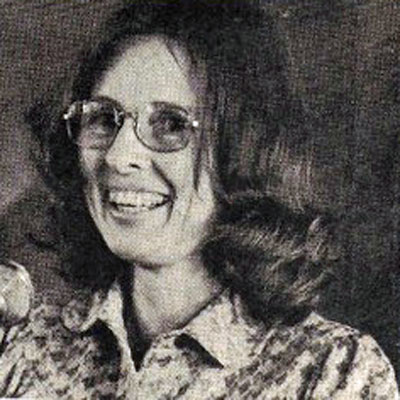
Astra Thor
The Sea Gull is gone but the memories remain; all good ones. I remember in 1968-69 how the “new” people crowded in off the land on cold, rainy days to meet people and have coffee and some of that fantastic pie and get warm, maybe for the first time since the previous week’s visit. The Sea Gull was relatively plain then with a more open feeling in the dining areas. It was fun to look out the window and watch the people or the rain. There was the great local talent jamming in the evenings.
I remember the empty feeling every winter when it closed for a few weeks to recuperate. I feel that way now.
Then there were changes; antiques, grillwork added, a more intimate dining room; the windows covered with ornate shutters. The Cellar bar was born. A more dignified atmosphere prevailed but still Mendocino came and enjoyed, although in a quieter way; the regulars and the tourists. The pie remained fantastic.
The Sea Gull continued to mellow. It was the community’s neutral territory to oldtimers, tourists and street people alike. It was a place for hearing the latest news, good conversations and running into at least a dozen people to say hello. What a fine place to nurse yourself on Sunday mornings with a large plate of potatoes and eggs a la Gary and gallons of coffee served with a flair, a smile and maybe a quip.
What will we do now for that nameless feeling that was the Sea Gull? I will miss seeing all the regulars—workmen, business people, the senior ladies who gathered for lunch in the coffee shop every day, the teacher, the pastor, the street people.
The Sea Gull is gone but fondly remembered. I was not a “regular” regular, but it was so comforting to know it was there. I hope the death of this era of Mendocino’s history will give birth to a new community spirit and hopefully a new Sea gull. We can fill a new building with out love.
Letters to the Editor, Mendocino Beacon Dec 15, 1976, Betty Barber
Out of Sunday morning from the grief-stricken crowd looking at the remains of the Sea Gull came the same feelings—“The Sea Gull was home”: “The Sea Gull is Mendocino”: “We have to do something to help; David Jones stay and rebuild.
For me, a newcomer to the area, working there was becoming part of the community.
David’s sensitivity, concern, and love and gentle business manner can never be destroyed.

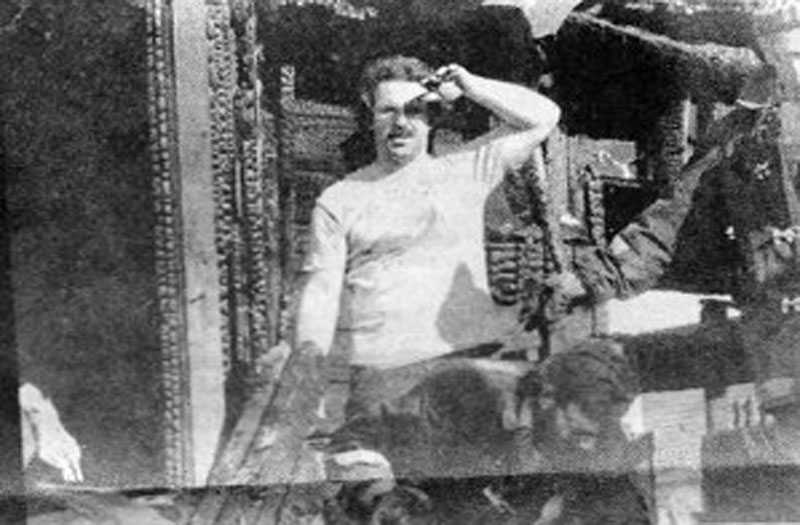
Dear “THINK”
Great piece.
Do you think the days of such “community” are gone or just lurking?
The 70s and 80s were a golden time for Mendocino and the Sea Gull was a special place way beyond my small role in it. Neither are coming back as they were then nor should they. However, the community we have now is special in its own way. I’m delighted to still be a part of it and look forward to the future with the same naive optimism that has always guided me. Thanks for reading!
Peter Brady gave me a slug of whisky that came through that fire, it was his bonus, as you mention. That was smokin’ good.
I was part of the Mendocino community in the 70s and 80s, , and rented a cottage from Alma Mendosa, not very far from the SeaGull. It was a very special community, one that I will never forget. I loved working with other musicians, singers and actors. It was deeply rewarding to be part of Gloriana Opera Company, to direct the College of the Redwoods choir, to be a musical theater voice ooach, to give private voice lessons. It was fun creating “Napkin Art” with a group that met every Sunday in the new SeaGull Cellar Bar. There was great music at the Seagull on the weekends, and hearing Judy Mahan sing was the best.. It was remarkable to get to know so many fellow visual artists. Some of the most interesting people I have known were and are friends from those times. It is a magical place and that period of time surely was “The Camelot Years.” I just needed fulltime employment in my field as a music teacher, so sadly, I left. If there were two lives to live, I would be there now.
I remember serving with you on the Art Center board. Great to know you Susan. Thanks for those heartfelt comments. David
Fantastic piece on the history of the SeaGull
This was the time we moved to Mendo. I remember the completed new Seagull. The paintings by Jim Maxwell of the locals as fable characters. Later, we had the Village Vidiot in the cellar bar.
Thank you ! Always great to hear voices from the past.